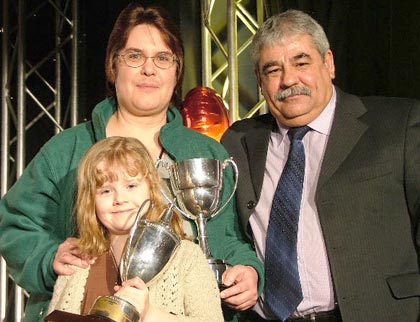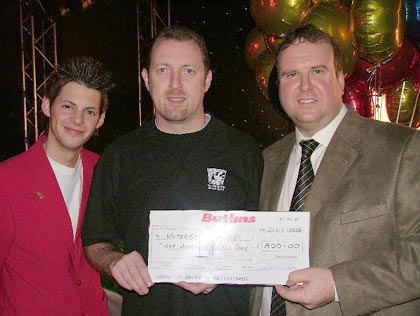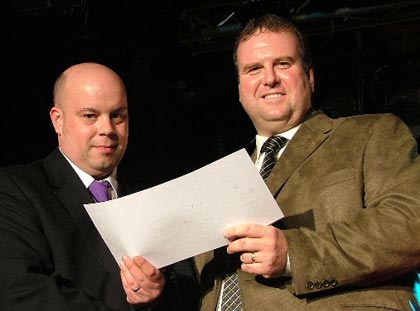2006 Butlins Mineworkers Open Brass Band Festival - Fourth Section retrospective
25-Jan-20064BR looks back on a contest where a wise approach with a young band showed the way to victory for Christine Gent and Thoresby Colliery Youth.

Christine Gent and 6 year old Rowan Hughes receive the Fourth Section first prize
If there was any disappointment at the Fourth Section Championship it was that there were no more than just the eight bands who made it to the starting line up on the weekend.
Given that the organisers had chosen an excellent test piece in Iain Rayner's neat ‘A Cavendish Suite', and that there was a lot of dosh on offer, you would have felt more bands would have fancied their chances. Unfortunately there were a spate of late withdrawals, and as a result the adjudicators Brian Buckley and Simone Rebello's task was made a little easier as the contest itself only took the best part of two hours to complete, and they had the chance to give fairly immediate comparisons between each of the bands.
It was also interesting to note that there were a group of potential new judges being put through their paces by Sydney Swancott in the hall behind a white screen – we wonder what decisions they came to on the day?
The set work gave the competitors something to get to grips with, but in a very straightforward and transparent manner. There were no hidden musical traps, excessive technical demands or interpretive pitfalls, and really all that was needed was control and mastery of the basics of good brass band playing. Not everyone did that though.
Brian Buckley has been around a very long time and is perhaps the most experienced adjudicator at this level the country, so it is always worthwhile listening to what he has to say about the performances he has heard when he has been in the box.
"It was a lovely piece for the bands to play,' he told 4BR. ‘It was well within the technical abilities of all the competitors, but musically there were challenges that not everyone met. Each of the three movements reflected the history of Bolsover Castle, but each was set out simply and effectively. There was no need to try and play anything that wasn't written or required in the score. If the bands mastered the basics of good brass band playing they were well on the way to playing this piece very well."
For Brian and Simone that was most readily heard in the performances of the winners and runners up, Thoresby Colliery Youth and Waterbeach Brass, and there was little you could disagree with them about their final placings.
Thoresby benefited greatly from quite excellent direction from their MD, Christine Gent who certainly brought her years of experience in playing in the Championship Section to bear on her very young band.
Thorseby only had three adult players in the ranks, whilst the rest of the band was teenagers and below. Christine chose sensible tempos, balanced ensemble and intelligent dynamics and her charges responded brilliantly. The first movement marked ‘Grandioso' is meant to portray the Grand Hall and there was a need for the bands to play with a sense of pomp and a little swagger. Christine achieved this by ensuring they didn't overblow and making sure the semi quaver work was spaced and not rushed, even when the tempo marking went up a notch or two to 132.
The second movement, ‘A Walk in the Garden' was perhaps musically the most taxing, asking questions of dynamic balance in particular and of the ability of solo lines to play with the marked expression. Again, Christine kept the volume down, the balance tight and allowed her young solo players the chance to shine. Notably her soprano player Shaun Pepper and flugel Joanna Wilmott shone, but so did others, and the cornet section in particular can take a great deal of credit for balancing with the main soprano line in the tricky muted section at rehearsal letter J. Not everyone took a much care about this as they did.
That just left the final movement, the upbeat ‘The Riding House' marked Allegro 120, but with some nasty technical moments to overcome in the shape of some tricky rhythms (especially the dotted quaver, semi quaver, quaver 6/8 meter) that underpinned the movement's shape.
Again, Christine allowed the music to flow without recourse to ratcheting up the speed, and so by the time the piece came to an end, the overall approach and execution left you with a real sense of understanding of the subject matter. It was not an error free performance by any means, but it was an intelligent and thoughtful one.
Christine was obviously delighted when we spoke to her after the announcement of the results, when she had finally got her hands on the £1200 first prize and the winners trophy. "I can't really believe it," she said. "We are such a young band, with only the three adult players, but everyone has worked so hard and they all deserve the success today. It was a lovely piece to play and the youngsters in particular enjoyed it. We really like coming to Butlins because the band can enjoy themselves, and tonight we will certainly be having a great time."
Waterbeach Brass may count themselves a little unlucky not to have won on the day after giving a very well shaped account of the test piece that also benefited from excellent direction from MD James Utting.

Waterbeach MD James Utting picks up the runners up cheque
He too kept the lid on the dynamics, emphasised the balance between sections and didn't let his players get too excited by keeping a tight rein on the tempos. They produced a more mature sound than Thoresby and it was perhaps the nervous start to the second moment that may just have cost them in the ears of the adjudicators. It took a little while to settle, but when it did, it was very well handled.
The outer movements were perhaps the best of the day with James Stygall on principal cornet a classy presence and Sarah Smith on euphonium a beacon of security.
It was the winner for us, but only just, but they should not be too disappointed with the result which should set them up nicely for the Regional Championships in a few weeks time. They should be one of the favourites on this form to claim a place at Harrogate later in the year.
The final podium place went to Bestwood Black Diamonds, conducted with a great bit of flair by Brian Draper, resplendent in his flock wallpaper Nehru style jacket.

Bestwood's Diamonds - Bestwood's rep picks up third prize
Their performance was a vibrant as the MDs sartorial elegance, upbeat and confident and the first movement in particular benefited from some compact ensemble work and a quite excellent xylophone player. The second movement was the one that cost them though with the glock out of synch at the start with the sop, and again at the end with the bell effects. They certainly recovered in the final section and ended in splendid style, but those errors midway through cost them any chance of challenging higher. Third place was well deserved though.
Thurcroft Welfare were without doubt the best band at the contest on the day, but made the fatal mistake of trying to blow their way to victory. Less is more at times, and all MD Andrew White had to do was take 20% off the volume and their performance would have benefited by 50% in terms of musicality and especially tuning.

Not quite a blank cheque - Thurcroft take the fourth place money
Andrew is certainly a talented conductor, but this should be a lesson learnt the hard way, for he must shoulder a great deal of the responsibility in allowing too much of a free rein with the dynamics. When they did take the edge off in places they sounded in a different class, but all too often it was hard and harsh, and particularly untuneful. This was a strong band trying to impose itself through sheer volume at times, when all that was really needed was less blowing – the music didn't need it. They will be disappointed with fourth place for sure, but if they can heed the lessons learnt they will head for the Regionals in good shape and a better band. Harrogate is well within their reach if they do.
The remaining bands didn't quite meet the challenges of the test piece in varying degrees, with the most disappointing being reigning champions Tewkesbury Town under Nigel Morgan. Last year they were excellent value for their win, but this time around, the number 1 draw and possibly cold instruments (it was quite bitter in the open air, where the bands waited) meant that their performance never got going and very nearly stumbled to a halt in a couple of places. Why this was so we don't know, but they just didn't seem to pick up the lead from their MD and it all rather felt flat.
Dronfield CMW too may have felt the cold, as it took one of the Bb basses to blow like the whale stuck in the Thames to warm up his instrument before they could start playing. After that it seemed to be going well, with some neat repiano playing noted in the first movement and Kate Hill on flugel showing her abilities in the middle movement. The last section though was untidy and it all ended up in a bit of a heap. Plenty of good things to note though and for MD Alan Tyler to work on in time for the Areas.
Royston unfortunately opted for the same approach as Thurcroft and as a result paid the penalty. It all started with one heck of a thump from the percussion in the opening bars, but it did recover and we heard the best bit of baritone playing all day. We don't quite know who or what played the sop solo in the second movement, but it wasn't the person it was written for, for sure! A bit harsh to end just robbed them of valuable points, but another band whose plus points far outweighed their minus ones.
Finally, Skegness under the direction of Geoff Weeks who did really well considering the lack of bodies round the stands, but there was some neat soprano work from Andrew Hewitt that caught the ear and some notable flugel playing from John Turner. In the end the lack of numbers cost dearly as the band tired in the final movement, but hats off for the effort and the spirit shown in performing in difficult circumstances where others cried off.
All in all then, well done to the winners and runners up in particular and also plenty of credit for many of the others too. It goes to show that at this level, good qualities count, and in Christine Gent and her Thoresby Youth Band they were there in spades.
Iwan Fox















